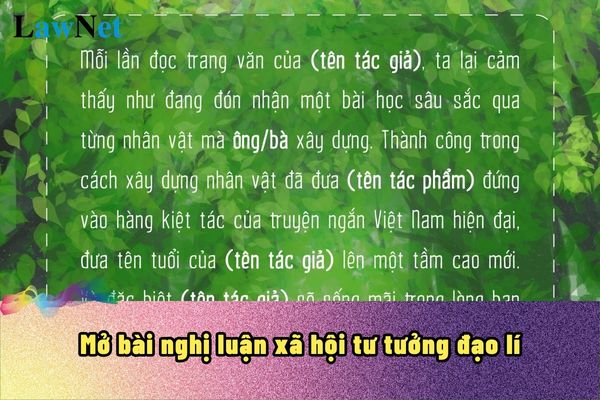What are the best sample introductions of social argumentative essays on an ideology/moral principle? In Vietnam, how much % of the 9th-grade Literature curriculum does reading content account for?
What are the best sample introductions of social argumentative essays on an ideology/moral principle in Vietnam?
Students can refer to the best sample introductions of social argumentative essays on an ideology/moral principle in Vietnam below:
|
Best sample introductions of social argumentative essays on an ideology/moral principle Sample 1 |
Note: Information on the best sample introductions of social argumentative essays on an ideology/moral principle is for reference only.

What are the best sample introductions of social argumentative essays on an ideology/moral principle? In Vietnam, how much % of the 9th-grade Literature curriculum does reading content account for? (Image from the Internet)
In Vietnam, how much % of the 9th-grade Literature curriculum does reading content account for?
According to the General Education Program for Literature issued with Circular 32/2018/TT-BGDDT, the time allocated for educational content is to be arranged proactively by textbook authors and teachers based on the requirements to be achieved for each grade and the actual teaching circumstances. However, a reasonable balance must be ensured among the following components:
- Between acquiring knowledge and skill development (with a focus on skill practice and application).
- Between different types and genres of reading, writing, speaking, and listening texts (allocating more time to reading literary texts).
- Between reading, writing, speaking, and listening skills (allocating more time to reading skill development); specifically, the time allocated for skills in each grade is as follows:
| Grade Group | Reading | Writing | Speaking and Listening | Periodic Assessment |
| Grades 1 to 3 | approximately 60% | approximately 25% | approximately 10% | approximately 5% |
| Grades 4 to 5 | approximately 63% | approximately 22% | approximately 10% | approximately 5% |
| Grades 6 to 9 | approximately 63% | approximately 22% | approximately 10% | approximately 5% |
| Grades 10 to 12 | approximately 60% | approximately 25% | approximately 10% | approximately 5% |
Thus, the reading content accounts for 63% of the 9th-grade Literature curriculum.
What are the regulations on reward and discipline for lower secondary school students in Vietnam?
Under Article 38 of the Regulations of Lower Secondary Schools, Upper Secondary Schools, and Multi-level Schools issued with Circular 32/2020/TT-BGDDT, the reward and discipline for lower secondary school students in Vietnam are specified as follows:
- Teachers, secondary schools and education authorities shall reward students with learning and training achievements in the following ways:
+ Commend them in front of the class or the whole school.
+ Grant them titles for students according to regulations.
+ Grant certificates and certificates of merit to students with outstanding achievements or exceptional improvement in learning or emulation movements and competition winners according to regulations and with permission from the Ministry of Education and Training.
+ Other ways to reward.
- Students making a mistake during the learning and training process shall be corrected or disciplined in the following ways:
+ Give the student a reminder, directly support them in correcting their mistake.
+ Reprimand the student, inform the student’s parent(s) to have the parent(s) cooperate in supporting the student in correcting their mistake.
+ Suspend the student’s study at school for a definite period and take other correcting measures according to regulations from the Ministry of Education and Training.

